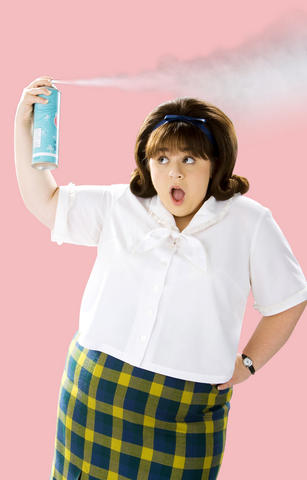That Hairspray is good-hearted is no surprise. Adam Shankman's film, lovingly adapted from the Broadway musical, preserves the inclusive, celebratory spirit of John Waters's 1988 movie, in which bigger-boned, darker-skinned and otherwise different folk take exuberant revenge on the bigots and the squares who conspire to keep them down. The surprise may be that this Hairspray, stuffed with shiny showstoppers, Kennedy-era Baltimore beehives and a heavily padded John Travolta in drag, is actually good.
Appropriately enough for a movie with such a democratic sensibility, there is plenty of credit to go around. Shankman, drawing on long experience as a choreographer, avoids the kind of vulgar overstatement that so often turns the joy of live musical theater into torment at the multiplex. The songs, by Marc Shaiman and Scott Wittman, are usually adequate, occasionally inspired and only rarely inane. And they are sung with impeccable diction and unimpeachable conviction by a lively young cast that includes Nikki Blonsky, Amanda Bynes, Zac Efron and the phenomenally talented Elijah Kelley.
Of course there are better-known, more-seasoned performers on hand as well, notably Queen Latifah, Michelle Pfeiffer, Christopher Walken and Travolta. But Hairspray is fundamentally a story about being young - about the triumph of youth culture, about the optimistic, possibly dated belief that the future will improve on the present - and its heart is very much with its teenage heroes and the fresh-faced actors who play them.

PHOTO: COURTESY OF GROUP POWER
Blonsky, a ball of happy, mischievous energy, is Tracy Turnblad, a hefty Baltimore high school student whose dream is to dance with the city's most telegenic teenyboppers on The Corny Collins Show. Bynes plays Penny Pingleton, Tracy's timid best friend, whose prim mother (Allison Janney) won't even let Penny watch the show, much less appear on it. Pingleton can scarcely imagine that her daughter will eventually fall for Seaweed (Kelley), part of a group of black kids whom Tracy befriends in the detention hall after school.
As Penny and Seaweed test the taboo against interracial romance, Tracy and Link Larkin (Efron), a Corny Collins dreamboat, take on the tyranny of slenderness. That Hairspray cheerfully conflates racial prejudice with fat-phobia is the measure of its guileless, deliberately simplified politics. Upholding both forms of discrimination is Velma Von Tussle (Pfeiffer), a television station executive who uses The Corny Collins Show - against the wishes of Corny (James Marsden) himself - as a way of maintaining the color line and promoting the celebrity of her blond, smiley daughter, Amber (Brittany Snow).
Hairspray does not seriously propose that Tracy and her new African-American friends face equivalent forms of injustice. But it does make the solidarity between them feel like an utterly natural, intuitive response to the meanness and arrogance of their common enemies. "Welcome to the Sixties," Tracy sings to her mother, conjuring up the New Frontier hopefulness of that decade's early years rather than the violence and paranoia of its denouement.
In freezing history at a moment of high possibility - a moment whose glorious popular culture encompasses West Side Story and the Twist, early Motown and Phil Spector's Wall of Sound - Hairspray is at once knowingly corny and unabashedly utopian. On The Corny Collins Show Seaweed and his friends are relegated to a once-a-month Negro Day, presided over by Motormouth Maybelle (Queen Latifah). Tracy envisions a future when, as she puts it, "every day is Negro Day."
What is missing from Hairspray is anything beyond the faintest whisper of camp. The original Hairspray may have been Waters' most wholesome, least naughty film, but there was no containing the volcanic audacity of Divine, who created the role of Edna Turnblad. Divine, who was born Harris Glen Milstead and who died shortly after the first Hairspray was released, belonged to an era when drag performance still carried more than a touch of the louche and the dangerous, and was one of the artists who helped push it into the cultural mainstream.
Perhaps wisely, Travolta does not try to duplicate the outsize, deliberately grotesque theatricality of Divine's performance or to mimic the Mermanesque extravagance of Harvey Fierstein's Broadway turn, choosing instead to tackle the role of Edna as an acting challenge. The odd result is that she becomes the most realistic, least stereotypical character in the film, and the only one who speaks in a recognizable (if not always convincing) Baltimore accent. ("Ahm tryna orn," she complains when she's trying to iron.)
A shy, unsophisticated, working-class woman, Edna is ashamed of her physical size even as she seems to hide inside it, as if seeking protection from the noise and indignity of the world outside. It is Tracy who pulls her out of her shell, and without entirely letting go of Edna's timidity, Travolta explores the exhibitionistic and sensual sides of her personality.
Walken's gallantry in the role of Edna's devoted husband, Wilbur, is unforced and disarmingly sincere, and their duet, (You're) Timeless to Me, is one of the film's musical high points. Another is Without Love, in which the two young couples express their yearning with the help of some ingenious and amusing special effects.
There are, to be sure, less thrilling moments, and stretches in which the pacing falters. But the overall mood of Hairspray is so joyful, so full of unforced enthusiasm, that only the most ferocious cynic could resist it. It imagines a world in which no one is an outsider and no one is a square, and invites everyone in. How can you refuse?
FILM NOTES:
Hairspray
DIRECTED BY: Adam Shankman
STARRING: John Travolta, (Edna Turnblad), Michelle Pfeiffer (Velma Von Tussle), Christopher Walken (Wilbur Turnblad), Amanda Bynes (Penny Pingleton), James Marsden (Corny Collins), Queen Latifah (Motormouth Maybelle), Brittany Snow (Amber Von Tussle), Zac Efron (Link Larkin), Elijah Kelley (Seaweed), Allison Janney (Prudy Pingleton), Jerry Stiller (Pinky), Paul Dooley (Spritzer), Nikki Blonsky (Tracy Turnblad)
RUNNING TIME: 107 minutes
TAIWAN RELEASE: Today

Following the shock complete failure of all the recall votes against Chinese Nationalist Party (KMT) lawmakers on July 26, pan-blue supporters and the Chinese Communist Party (CCP) were giddy with victory. A notable exception was KMT Chairman Eric Chu (朱立倫), who knew better. At a press conference on July 29, he bowed deeply in gratitude to the voters and said the recalls were “not about which party won or lost, but were a great victory for the Taiwanese voters.” The entire recall process was a disaster for both the KMT and the Democratic Progressive Party (DPP). The only bright spot for

Aug. 11 to Aug. 17 Those who never heard of architect Hsiu Tse-lan (修澤蘭) must have seen her work — on the reverse of the NT$100 bill is the Yangmingshan Zhongshan Hall (陽明山中山樓). Then-president Chiang Kai-shek (蔣介石) reportedly hand-picked her for the job and gave her just 13 months to complete it in time for the centennial of Republic of China founder Sun Yat-sen’s birth on Nov. 12, 1966. Another landmark project is Garden City (花園新城) in New Taipei City’s Sindian District (新店) — Taiwan’s first mountainside planned community, which Hsiu initiated in 1968. She was involved in every stage, from selecting

Water management is one of the most powerful forces shaping modern Taiwan’s landscapes and politics. Many of Taiwan’s township and county boundaries are defined by watersheds. The current course of the mighty Jhuoshuei River (濁水溪) was largely established by Japanese embankment building during the 1918-1923 period. Taoyuan is dotted with ponds constructed by settlers from China during the Qing period. Countless local civic actions have been driven by opposition to water projects. Last week something like 2,600mm of rain fell on southern Taiwan in seven days, peaking at over 2,800mm in Duona (多納) in Kaohsiung’s Maolin District (茂林), according to

As last month dawned, the Democratic Progressive Party (DPP) was in a good position. The recall campaigns had strong momentum, polling showed many Chinese Nationalist Party (KMT) lawmakers at risk of recall and even the KMT was bracing for losing seats while facing a tsunami of voter fraud investigations. Polling pointed to some of the recalls being a lock for victory. Though in most districts the majority was against recalling their lawmaker, among voters “definitely” planning to vote, there were double-digit margins in favor of recall in at least five districts, with three districts near or above 20 percent in